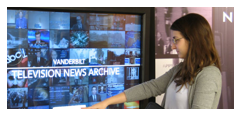
Hundreds of thousands of TV news broadcasts on one website
The following blog post is written by Roger Macdonald, director, Television Archive; Brewster Kahle, digital librarian, Internet Archive. Photo credit: IceNineJon
We are seeing more and more public benefits arising from applying digital search and analysis to news from our most pervasive and persuasive medium— television. That’s why, we are thrilled to announce that the Internet Archive, one of the world’s largest public digital libraries, is expanding our television news research library to make readily available hundreds of thousands of hours of U.S. television news programs for users to search, quote and borrow.

The expansion plan is being supported by $1 million in funding from Knight Foundation. With this support, we will grow our TV News Search & Borrow service, which currently includes more than 400,000 broadcasts dating back to June 2009, to add hundreds of thousands of new broadcasts. This means helping inform and engage communities by strengthening the work of journalists, scholars, teachers, librarians, documentarians, civic organizations and others dedicated to public benefit.With TV News Search & Borrow, these folks can use closed captioning that accompany news programs to search for information. They can then browse short-streamed video clips and share links to specific ones. The research library does not facilitate downloading, but individuals can watch whole programs at Internet Archive headquarters in San Francisco, Calif., or borrow them on DVD-ROMs.
Along with ramping up our current offerings, Knight funding will help us add new features and website enhancements to improve user experience, strengthen audience engagement and integrate with media partner collections.
We look forward to building momentum with these new enhancements. Already, we are seeing a growing community of users apply the service to improve their work. Journalists are better able to investigate significant persons and events. Documentarians are more effectively finding key news footage to license and use. Educators are focusing the critical attention of their students on how news stories are told and audiences engaged.

We recently worked with researchers at Harvard’s Berkman Center and MIT’s Center for Civic Media to enable direct machine queries of our television news library that returned structured data results to inform their media landscape analysis of the Travon Martin story and reveal key pivot points in its evolution.
Journalists and documentarians at the recently-launched Retro Report are using TV News Search & Borrow to help them take a fresh look at important stories of the past. Using the service, they are sharing new perspectives and adding insightful commentary to what are sometimes all too shortsighted first drafts of history.
We are also working with a number of scholars, journalists and civic organizations to see how our research library might help improve political accountability and transparency by indexing television political ads and pairing them with information on sponsors from FCC-mandated “public inspection files” at each station.

Such a special collection could also be used to study interactions between campaign messaging and local news coverage. We think the 2013 elections in Virginia, a state with no political campaign contribution limits, may be a useful test-bed for experiments like these.
We are following up on suggestions from some media professionals that a comprehensive research library of local television news might also better inform stations and their audiences about how programs are helping to meet the critical information needs of local communities.
By allowing people to responsibly access an enduring library of television news, our TV News Search and & Borrow service stands on the shoulders of the pioneering work of Vanderbilt University’s TV news Archive and, more recently, UCLA’s NewsScape library.

We are ready to explore new territory in scaling access to our growing digital library of television news and welcome feedback on how we can better serve the public interest.
By Roger Macdonald, director, Television Archive; Brewster Kahle, digital librarian, Internet Archive.
Related links: “Internet Archive Gets Huge Boost from Knight Foundation” on MediaBistro.com and “From Cronkite to Couric: Internet Archive gets $1 million to expand TV news collection” on Gigaom.com
Recent Content
-
Journalismarticle ·
-
Journalismarticle ·
-
Journalismarticle ·


